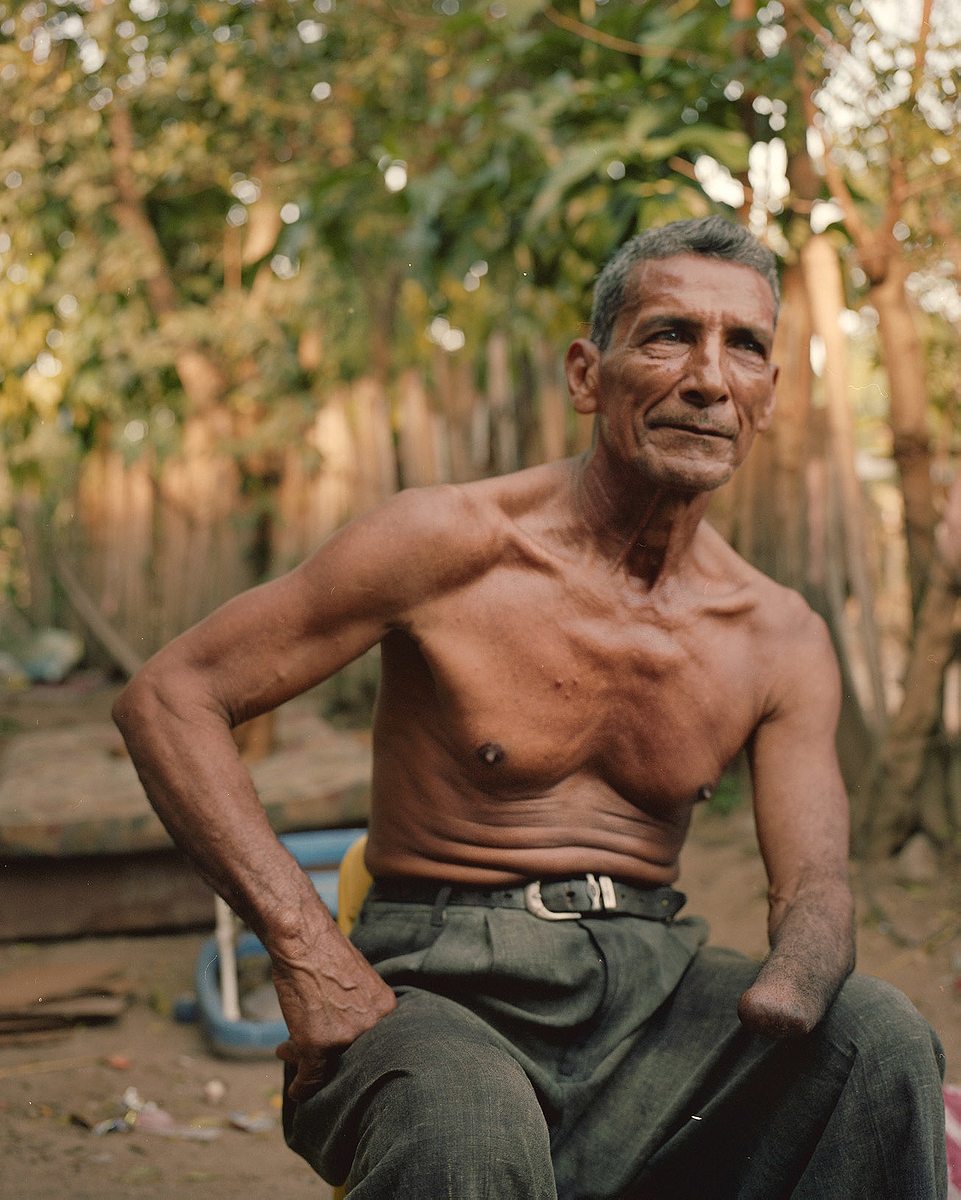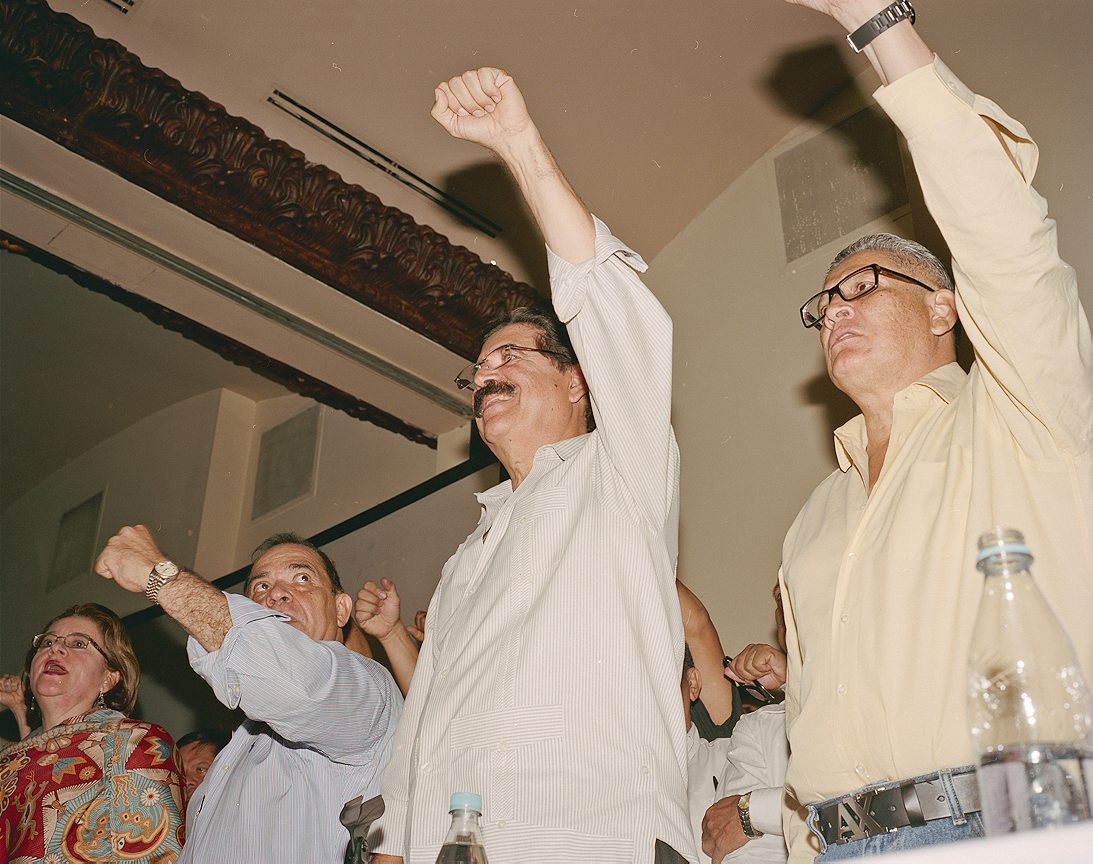In rural Honduras, poverty, murder, and injustice fuels a battle between farmers and rich landowners.
TAUJICA, Honduras—
Our fixer pulls the car to the side of the dirt road, a short distance from a small store selling snacks and soda. Groups of men sit in the shade; others lean against poles. They look away from the mounted LCD TV screening Will Smith’s Ali to stare at us. The store is essentially the center of town. A large man in a pressed shirt walks over to the car. Leaning down to the window, he asks what we’re doing. He wears a cowboy hat, a mustache, and a guarded look; a black pistol is in the waistband of his jeans.
We’ve come to report on the continuing conflict between poor farmers and rich landowners around Taujica, a small town in Honduras’ Bajo Aguán Region, a 5-hour drive from the world’s murder capital, San Pedro Sula. The roads we drove to get here, lined with lush vegetation, cut through mountains and hug the Caribbean Sea. They’re stuttered by pop-up towns and police checkpoints. The checkpoints continue on in Bajo Aguán, but there the checkpoints are manned by campesinos, or small-scale farmers. Lawlessness has long been the rule in Honduras. Just since October, some 16,000 children have left Honduras for the United States—so many that Washington is now considering granting refugee status to some before they flee. They’ve run away from poverty and murder—the country’s two biggest cities, San Pedro Sula and Tegucigalpa, have the first and fourth most murders per capita in the world.
Bajo Aguan is virtually off limits to the country’s army and police
They have also fled injustice in rural Honduras. These days Bajo Aguán is virtually off limits to the country’s army and police. Campesinos have been the victims of private security and government forces, and the Honduran government has done little to halt it. The ruling right wing National Party protects rich landowners. They’ve focused on maintaining security and addressing violence with force The left paints the campesinos as victims and pacifists. At stake is fertile land, and massive profits.
Bajo Aguán is the rural center for palm oil production and land rights battles. Palm oil is in everything from Ben & Jerry’s ice cream to Johnson’s baby shampoo to Pringles. During the last decade, large energy companies like BP have begun heralding palm oil as the next green biofuel. Across Africa the spread of plantations has threatened chimpanzees with extinction. In Indonesia and Malaysia, the world’s leading producers, its extraction is linked to human rights abuse. Honduras is no different.
The recent Human Rights Watch report, “There Are No Investigations Here,” seems to have moved the government to create a special investigation unit for Bajo Aguán crimes. What they’ll uncover and prosecute remains to be seen. Rights groups report that at least 77 campesinos have been killed in targeted attacks since January 2010, months after the country’s last coup. The ousted president, José Manuel Zelaya Rosales, of the Liberal Party, had previously agreed to review the campesinos’ land title claims. The coup was backed by wealthy landowners as well as Miguel Facussé, owner of Dinant Corporation, the country’s largest palm-oil manufacturer.
Land in Honduras means power
Shortly after, Facussé received a $30 million loan from the World Bank’s International Finance Corp. to expand his African palm plantations. The World Bank stalled on the second half of the loan after reports of human rights violations. But the actual story may be more complicated. According to local media reports, campesinos are increasingly a threat to other campesinos, a divergence from the dominant narrative, which reduces campesinos to one dimensional victims. Today’s movements appear to have learned from the government in their suppression of inconvenient truths.
Nowhere is this more true than in the Taujica community, home to two campesino movements, MUCA (Unified Campesino Movement of the Aguán) and MOCRA (Peasant Movement for the Recovery of the Aguán). The two groups are fighting for the same thing—land, which in Honduras means power. In the process, the groups are believed to be committing crimes against one another and contributing to the continued lawlessness—but neither acknowledges doing so. Instead, all violence in Taujica is blamed on Dinant’s security.
The recent violence is the latest phase in a decades-long battle over land rights in Honduras that’s been aggravated by bad record-keeping and poverty. “The country has a remarkably skewed land holding system,” says Larry Birns, director of the Washington, D.C.-based Council on Hemispheric Affairs. “Ten percent of the population holds 80 percent of the land. What you have in the country is an oligarchy, largely today an agricultural oligarchy. Land holding families like the Facussés are in a position to exercise enormous influence not only over the military but over the political apparatus.”

Taujica is a town divided, with independent campesino land across the street from Facussé’s land. At the checkpoint, I mention the name of a contact in the campesino movement and the guard, his body filling out his buttoned-up shirt, straightens, and waves us towards the small neighborhood, its dirt roads running in a grid from the store. Teenage boys race up and down the uneven streets on motorcycles. Light wire fences mark boundaries between the properties. They’re a study in contrasts. The dirt in one yard, belonging to a Dinant Corp. employee, is carefully raked and free from litter. Most yards aren’t. A woman some distance from the store talks to us in the shade of a tree. “I hear weapons being fired off all the time, up there at the corner. They [campesinos] get drinking and fire their guns. So not surprised when someone dies,” she says.
Several streets over we speak with 73-year-old Rodolfo Rodriguez, a campesino who lives in the community. He’s missing a hand and is covered with a layer of dirt. The yard is littered with plastic and a mattress. Rodriguez calls a friend over from the street. He’s wearing a beat-up blue oxford shirt over a large belly. He stands over us while we sit and talk in the shade of the darkened home. Children, pantless, roll on the mattress. The friends exchange looks as we talk about violence. “People say it, but it’s not a problem. People adapt. People adapt to anything,” Rodriguez says. “I wasn’t used to seeing violence, it wasn’t like it was back in the day. It’s gotten more violent in the last eight to 10 years.”
Not surprisingly, Rodriguez’s friend doesn’t want to share his name. Given the violence they’ve experienced, campesinos are wary of outsiders. He’s loud, on message, and unfriendly, towering over us as he talks. “People call us guerrillas,” he says, even though none of us has suggested as much. He pulls up his shirt, “All I have is my cord belt,” he says, smacking his bare stomach to show he’s unarmed. “All we want is to fight for our sons and daughters.”
The second man, Eugenio Ayala, decides he’s O.K with us and we join the men watching a soccer game at a nearby field, where local teams are competing for 15,000 lempiras, roughly $750. “This is where the fight of MUCA started, in this settlement,” says Celio Rodriguez, 34, president of Nueva Confianza Settlement. The land, Rodriguez says, was bought back from Facussé just a year ago, on a 14-year loan from the government. “Violence has dropped off, but it doesn’t mean it’s cool. There’s always violence and repression from police and military who’re in the service of Facussé.” According to the campesinos, all problems trace back to Facussé. We watch the young men hustle in the sun, the field centered by a flagpole from which the red Libre Party flag flies. Across the street from the field there are banging noises. Someone in the small crowd says, “It’s a little early for gunshots.”
Play ball with the party in power and you will be looked after
The emergence of campesino-on-campesino crime, of armed gangs operating in Bajo Aguán, is a natural outgrowth of the power vacuum created by the government’s failure to govern. In this sense, it’s similar to the many gang-controlled areas of San Pedro Sula. The Honduran government’s contradictory approach—the ruling National Party has promised troops on every corner to address the violence, while the opposition Liberal Party’s answer is addressing land rights—means problems are essentially addressed according to patronage. Play ball with the party in power and you will be looked after. In a sense, both parties are right. Crisis-level violence demands a crisis-level response; a long term response—addressing poverty and root causes—will do little in the moment, but will probably be necessary in the end.
And yet a middle path does exist, weaving its way through campesino factions, gangs, and the law itself. A mutual friend introduces us to a campesino I’ll call Raul Mendoza. Mendoza, a young farmer, has managed to live, thus far, without picking a side—Facussé, the gangs, or the government. It’s a challenging task in an insular community where people talk. He has an open smile and an easy laugh. An ex-con, he may be the most honest person we met in Honduras. Prison has prepared him to return home to Bajo Aguán. “Being marginalized and humbled gave me wisdom. It’s the law of the strongest man rules,” he says.
We meet Mendoza in town and drive out to the fields. The road is empty but for some passing campesinos, one on a mountain bike, another in a horse drawn buggy. The sun breaks through clouds, cutting lines of light through the gray sky: These are Honduras’ Killing Fields. One side of the road is independent campesino land, the other Facussé’s. Mendoza, as an independent, can talk to Facussé’s security. Other campesinos can’t. Facussé’s guards and the campesinos of MUCA and MOCRA are essentially at war with each other. It leaves Mendoza in an awkward neutral place. “There are problems, there are problems,” he says, staring out the window.

Mendoza’s often jovial presence and quickness to acknowledge his own faults or good fortune sets him apart from anyone else we’ve met in campesino movement. We join another MUCA representative for a guided tour of their settlement-a gated community where 700 families live. The late morning sun has driven everyone to shade, whether at work under the palms, or inside. In June 2012, they purchased the land using government loans. They were able to buy back 4,000 of the 11,000 hectares of land post-coup President Pepe Lobo had granted. As MUCA has taken steps to become self-sustaining, the challenge to move from resistance to being proactive—paying back its $20 million loan—has only just begun.
Still, the cooperative’s reach is impressive. There are four pools of fish. There’s a chicken farm nearby. We drive further into the settlement on our guided tour where we watch a handful of campesinos work the land under rows of palms. Leaving, our escort, a well-known community member, is obscured by the tinted window. Men with machetes and guns stare at us and approach the car. “What the fuck were you doing here?” a man says. If our escort hears their words, he doesn’t acknowledge them. It’s telling that, even with the proper contacts, the threat, the level of distrust, is high.
On another morning, we walk the land alone with Mendoza. The sun piercing the palm canopy lights the landscape, bouncing off pools of water left from recent flooding. It’s only in places like this, separated from others, that Mendoza is free to talk. He laughs as we swat at mosquitos. With only the trees and the sky to hear him, he says “You can’t say I’m a free man.”
Note: some identifying details have been changed
Reporting in Honduras was supported by a grant from the Pulitzer Center. All photographs by Dominic Bracco II/Prime for Pulitzer Center on Crisis Reporting
